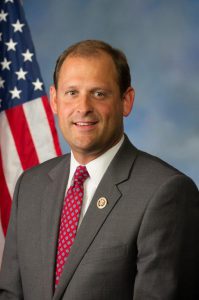
Rep. Andy Barr
U.S. Rep. Andy Barr (R-KY) has introduced two bills aimed at providing more living and job training opportunities to Americans struggling to recover from drug addictions.
“It is critical that Congress do more to combat the opioid epidemic, especially in my home state of Kentucky where we have the third-highest opioid overdose mortality rate in the nation,” Rep. Barr said. “I’m proud to introduce these two crucial pieces of legislation that will empower individuals overcoming addiction.”
On May 9 Rep. Barr proposed the Transitional Housing for Recovery In Viable Environments (THRIVE) Act, H.R. 5735, and the U.S. House of Representatives’ version of the Comprehensive Addiction Recovery through Effective Employment and Reentry (CAREER) Act.
As a member of the House Financial Services Committee, which has jurisdiction over federal housing policy, the congressman said he understands that lawmakers “must support policies that expand transitional housing options and workforce development initiatives for individuals in the recovery process.”
The THRIVE Act, H.R. 5735, would amend the United States Housing Act of 1937 to establish a demonstration program to set aside Section 8 Housing Choice Vouchers for supportive and transitional housing for individuals recovering from opioid use disorders or other substance use disorders, according to the congressional record summary.
H.R. 5735 was inspired by successful recovery organizations in Rep. Barr’s Sixth District and informed by hearings in the House Financial Services Committee, as well as by discussions with U.S. Department of Housing and Urban Development Secretary Ben Carson, according to the lawmaker’s office.
If enacted, the bill would create a pilot program to allocate housing vouchers to transitional housing non-profits with evidence-based models of recovery and life-skills training, according to a summary from Rep. Barr’s staff.
The bill has been referred to the House Financial Services Committee.
The CAREER Act, S. 2730, introduced on April 23 by U.S. Sen. Mitch McConnell (R-KY), would amend the Public Health Service Act to establish a pilot program to help individuals in recovery from a substance use disorder transition from treatment to independent living and the workforce, among other purposes, according to the text of the bill.
S. 2730 has been referred to the Senate Health, Education, Labor, and Pensions Committee.
“Transitional housing is a proven, evidence-based approach that has helped thousands of Americans maintain sobriety after completing rehab, gain valuable skills and job training, obtain employment, and eventually transition back into society to lead independent lives,” said Rep. Barr.
The CAREER Act, according to a summary from the congressman’s staff, would encourage partnerships between local businesses and treatment centers around job training, employment, and housing options for individuals in recovery, and also would provide more flexibility to states, which could direct federal funding to specific local initiatives.
The bill is clearly focused on combating the nation’s opioid epidemic. For instance, S. 2730 would award five-year grants to five states selected from among the 10 states having the highest rate of death due to drug overdose per 100,000 people, based on data from the Centers for Disease Control and Prevention for calendar years 2013 through 2017, according to the text of the bill.
Likewise, based on federal data for those same years, priority would be given to the states having the highest average rates of unemployment; the lowest average labor force participation rates; and the highest prevalence of opioid use disorder based, according to the text of S. 2730.



